As Dusk Falls review – Gripping narrative adventure elevated by real player choice
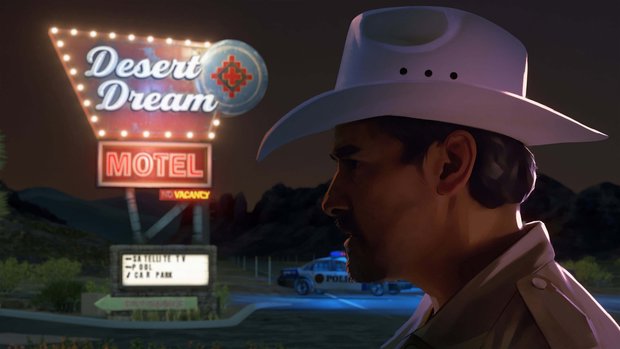
- 1 Comment
Modern narrative adventures routinely suffer from a false illusion of choice. These experiences promise a malleable story shaped by your decisions, but more often than not this agency is a ruse, ultimately proving your choices do not matter apart from some minor changes in dialog. It’s not an easy thing to make a game feel like you are in control of the plot, which is what makes As Dusk Falls so refreshing. Even from early on, there is a weight to almost every decision required of you. It’s a gripping narrative that works extremely well for the first half, and while it loses its way a bit in the second half, it is still a rewarding experience that few other games of its kind are able to match.
The story explores how someone’s life can change suddenly through no fault of their own, and how the decisions they make in the moment can affect them for the rest of their lives. Here a robbery gone wrong is the catalyst that throws disparate groups of people together. There is not one main character, there are several. Vince, a disgraced airline mechanic along with his family, Michelle, Zoe and Jim, have left their life in California and are on their way to build a new life in St. Louis. Their fortunes change for the worse when the Holt family, on the run from the police, barricade themselves in the motel they’re staying at and take them hostage.
The first thing you’ll notice is the distinctive presentation comprised of hand-painted people and landscapes. It feels very much like an interactive graphic novel on autoplay. The characters do not move their mouths when they speak, and they do not walk around. It could be off-putting to some players as it is a bit jarring at first, but once you’re able to adjust, the level of detail in the artwork makes up for the general lack of animation. Facial expressions are drawn in such a way that each nuanced emotion is captured. Less is more here, for sure. There are some moments of motion, however. Cars you’re in actually drive, for example, and there’s an instance of smoke billowing around the room that’s so effective you can almost feel it irritating your eyes.
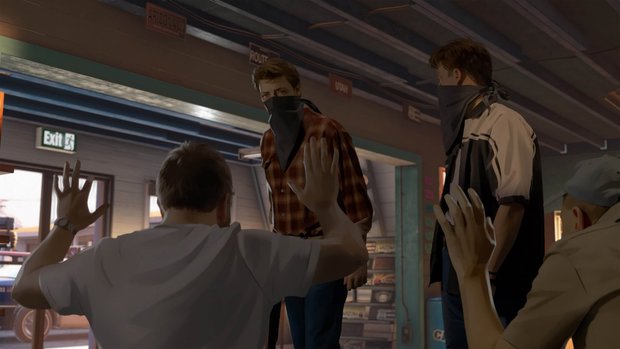
Gameplay is also a fairly minimalist affair. Most of your input will be spent choosing either what to say or how to react, though there are some points where you’ll need to move the cursor around in search of something to interact with, whether it’s pictures to look at, drawers to open, or documents to read or other similar actions. Such moments are few and far between, however. Dialog options are the bread and butter here.
Fortunately, the choices and consequences do not feel completely arbitrary, nor are they so basic and transparent that you know exactly which option will give you which result. There’s a moment when Vince is trying to get on someone’s good side, and if you were paying attention and caught certain cues you would know a particular action will give you the outcome you’re looking for. When you are presented with a dialog choice, there is usually a timer of around fifteen seconds that counts down until you pick an option. The plot-altering choices are accompanied by a loud heartbeat and red-tinged screen to highlight the importance of your decision. The game will choose an option for you if you don’t react fast enough or are indecisive, so you’ll be letting go some control of the story.
The game is broken up into two “books” and each book has three chapters. I liken it to a television series where each book is a season, and each chapter an episode. Books end dramatically with a cliffhanger that leads to credits rolling, adding to the serial TV show vibe. When you finish with a chapter, you are presented with a flow chart of the events that transpired, and you can see the choices you made along with the percentage of players who made the same decisions. This visualization of narrative branches is a great way to see how you helped shape the story and gives you an idea how many ways things could have gone differently.
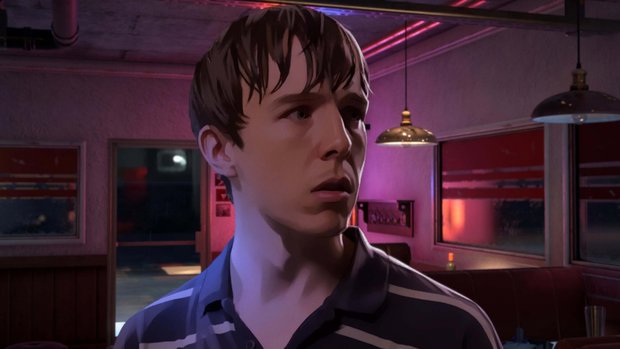
You can even choose to replay by starting from a pivotal juncture without having to backtrack too much. I got to a point where my decisions led to a main character dying and I did not want to continue with the remainder of the game with them no longer around, so I restarted from the beginning of the chapter with all my previous decisions saved and went a different route. I had the option to overwrite the initial story or keep everything I had done while creating a new saved game. It’s a nice user-friendly option allowing you to experiment as much as you like.
An interactive adventure with limited gameplay cannot succeed without an interesting and gripping narrative, and for the most part As Dusk Falls offers just that. The first few chapters take place during a desperate standoff in the lobby of an Arizona motel in the year 1998. It’s a tense, fast-paced experience that has you questioning your choices right away and puts you in a “what would I do in this situation” mindset. Much of this time you will control Vince, and your only concern is making sure your family survives. But Vince is pitted in the middle of a years-long feud between the Holt family and the town Sheriff, each trying to use him to their advantage. Will you side with law enforcement, or will you keep your head down and keep the guns pointed away from you and your family? It can be quite riveting debating with yourself on what the outcome might be as you choose between available dialog options.
Unfortunately, the pace starts to drag about two-thirds of the way through when the action progresses beyond the motel to places like Salt Lake City and the Idaho wilderness. Along the way are a few unnecessarily melodramatic plot twists that weaken the overall narrative. The game also ends on a cliffhanger, and even though there was plenty of foreshadowing that something like that was coming, it’s inserted at the very end after things seemed to have wrapped up nicely, for no apparent reason except to set up a potential sequel. The game would have been better served as a purely standalone experience.
Where the storytelling really excels is in its character development. Nearly everyone you meet is multi-dimensional, with past circumstances driving their current actions. The Holts start off seeming like they are there strictly to antagonize Vince and his family, but you soon begin to see them as damaged people driven to desperate measures by circumstances out of their control. And even though they make decisions that put innocent lives at stake, you understand their motivations.
As Dusk Falls has no clichéd villain who is evil strictly because the plot calls for it. The closest thing the game comes to introducing one is the sheriff, but even he is shown to be sympathetic in some scenes. You’re not hit over the head with “this person is doing something bad but look at all the reasons why” either. The script is more subtle than that, with people’s motivations coming into focus through flashbacks and dialog. It’s a mature approach to storytelling that gives these characters a depth rarely seen in games. It must have been fun for the actors to portray such strong but flawed characters.
This brings up arguably the strongest aspect of As Dusk Falls: the voice-overs and music. The storytelling wouldn’t have been nearly as effective without confident and skilled actors performing their roles. These are legit, professional actors with plenty of credits on their IMDb pages. You may not recognize their names, but you may have seen some on popular television shows. In a game with almost no animation, there’s a lot of heavy lifting required of the people bringing still frames to life, and the result is almost flawless here. The soundtrack is great as well, on par with a motion picture. It’s haunting and powerful and captures the tone of the game perfectly.
Final Verdict
If you’re a fan of character-driven works of interactive fiction, and a graphic novel-style presentation doesn’t turn you off, you should seek out As Dusk Falls. Not a particularly long game, taking around seven hours to complete a single playthrough, it lacks much in the way of traditional gameplay, but the writing, acting, and genuine consequences for your actions more than make up for it. The later chapters falter somewhat in their effectiveness, and the ending feels unnecessarily jarring, but there’s plenty of replayability and lots of incentive to try new paths, making the game a strong choice for story lovers.
Hot take
The narrative impact weakens as the game goes on, but As Dusk Falls flows smoothly and gives your choices real importance, making it highly replayable and easy to recommend.
Pros
- Story starts out strong and grips you with its excitement and tension
- Voice acting is consistently excellent
- Player choices really shape and alter events, making you feel in control
- Multiple paths provide incentive to go back and play through different ways
Cons
- Lack of animation can take some getting used to
- Strength of the story diminishes as it progresses
- Ends on an unnecessary cliffhanger
Tom played As Dusk Falls on PC via GamePass.

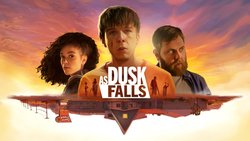


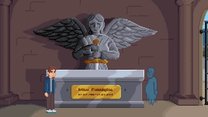




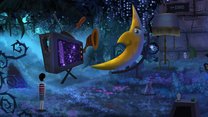
1 Comment
Want to join the discussion? Leave a comment as guest, sign in or register in our forums.
This sounds like a lot of fun. I feel similarly about games where the choices don't really matter, so glad you highlighted that.
Reply
Leave a comment